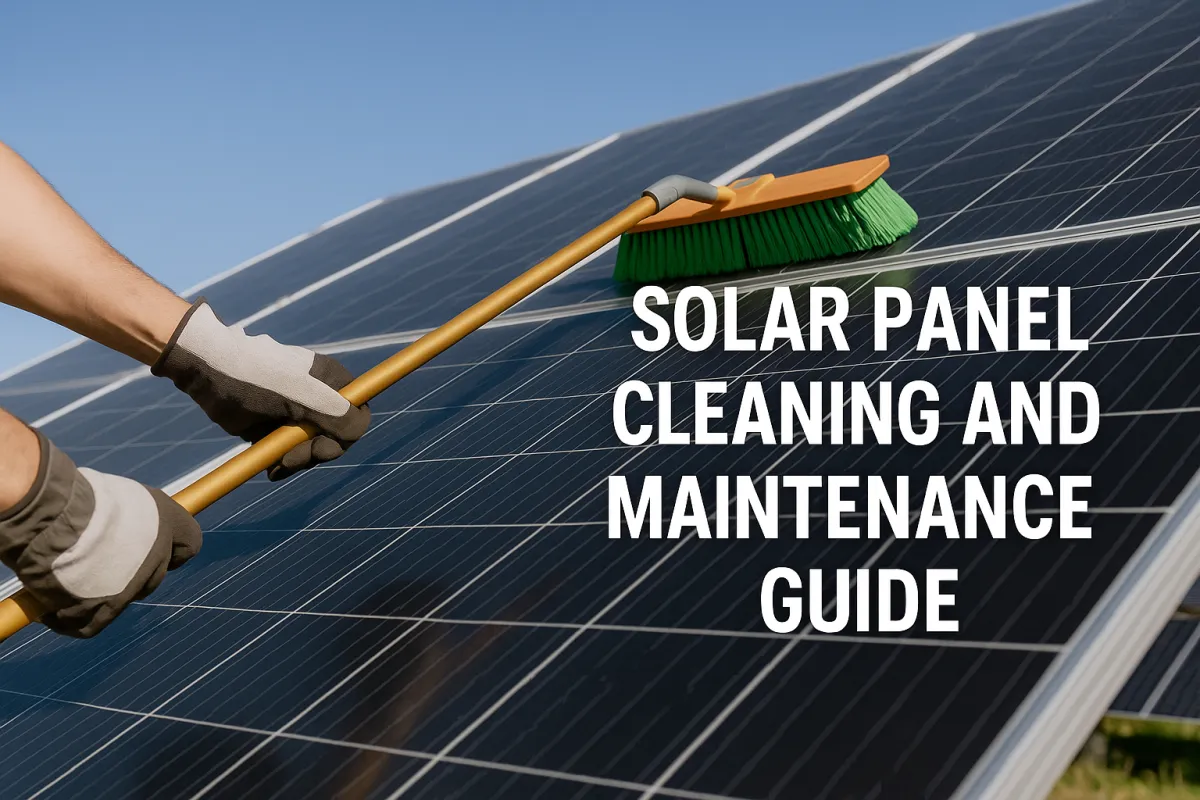
Solar Panel Cleaning and Maintenance Guide
Solar panels are an investment meant to last 25–30 years—but only if you treat them right. In this comprehensive guide, you'll discover how to clean and maintain your solar panels to keep them performing efficiently and safely. Learn when to clean, how often, what tools to use, and when it’s best to call in the pros. We cover everything fromDIY tipstoprofessional cleaning, and how environmental factors likeshading,dust, andbird droppingsimpact your panels' efficiency. You'll also get advice onavoiding common mistakes, such as using pressure washers, and whyroutine inspectionsandperformance monitoringare essential. This guide is rooted in years of field experience, and if you're a homeowner in the UK looking for expert help, you're only one step away.
Why Maintenance Matters More Than You Think
Solar panels don’t have moving parts, which leads many to assume they’re maintenance-free. The truth? While they require less upkeep than a petrol-powered generator, they still demand attention if you want consistentenergy outputand long-term value.
Letting layers ofdirt, dust, and debrisbuild up on the surface can block sunlight—slashing your panels’ ability to do their job. In fact, research shows that neglecting cleaning can reduce solar performance by up to 25%. Add inbird droppings, tree sap, and industrial grime, and yourphotovoltaic (PV) system carebecomes a top priority.
"Clean panels are efficient panels. Maintenance isn't optional—it's preventative."
When Should You Clean Solar Panels?
There’s no one-size-fits-all rule here. Yourcleaning frequencyshould depend on where you live and what surrounds your panels.
Urban & industrial areas: Pollution builds up faster; consider quarterly cleaning.
Rural areas: Dust from ploughed fields means twice-a-year is a safe bet.
Rainy climates: You might stretch it to once a year, butrain as a natural cleanerdoesn’t scrub off sticky residue or droppings.
Visual inspectionevery 3 months is your safety net. Use binoculars or a drone to check for obvious blockages or panel shade. And remember: alwaysturn off your system before cleaning. It’s not just good advice—it’s a safety must.
Request a quote herefor expert solar panel care.
How to Clean Solar Panels Safely and Effectively
DIY can work if your panels are accessible and you’re equipped with the right tools. Here’s how to clean them like a pro—without stepping on your roof.
Tools You’ll Need
Non-abrasive sponge or soft brush
Telescopic poleorextension rod
A hose withgentle spray
Bucket of warm water +deionized waterif possible
Mild, eco-friendly soap
⚠️ Avoid pressure washers—they can damage seals, wiring, and coatings.
Step-by-Step Cleaning
Pick the right moment: Early morning or a cloudy day to avoid evaporation.
Turn off the solar systemat the inverter or main switch.
Use your pole and brush to removeloose debris, working from the top down.
Apply soapy water gently—no hard scrubbing.
Rinse with clean water (ideallydeionized).
Dry using a soft squeegee or leave to air dry if streak-free.
If panels are too high or require ladders—don’t risk it. Call forprofessional cleaninginstead.
Explore ourUK-wide service areasto see if we're in your region.
Don't Just Clean—Monitor & Maintain
Cleaning is just one piece of the puzzle. For a fully optimised system, you’ll also want to focus on these key areas:
1. Performance Monitoring
Use a solar monitoring system to track daily production. Sudden drops? You might have a dirty panel—or something more serious.
2. Inverter Maintenance
Your inverter converts sunlight into usable electricity.Inverter maintenanceor evensolar inverter replacementevery 10–15 years is standard. Keep an eye on inverter lights—green means go, anything else means it’s time to call for help.
3. Annual Inspection
Schedule aprofessional inspectiononce a year to check wiring, seals, and connectors. This is also your chance forthermal imaging inspectionto catchmicrocracksor hot spots early.
Not sure what to track? Set up amaintenance logbook. Record cleanings, inspections, energy dips, and repairs. It keeps you organised and helps withwarranty compliance.
Until then, learn how we're helping homeowners and commercial clients maximise their solar returns through smart upkeep andwindow cleaning lead generation.
Part 2: Keeping Your Panels Problem-Free Year After Year
The Silent Killer: Shading and Solar Degradation
Even partialshading—from overgrown trees, chimneys, or nearby buildings—can drastically reduce solar productivity. Why? Because most residential systems usestring inverters, and if even one panel is shaded, theenergy outputof the entire string drops.
What You Can Do
Trim vegetationregularly to maintain fullsunlight exposure.
Schedule asolar array alignment checkif your panels were installed years ago.
Inspect for creeping plants like ivy, which canshade or damageyour panels.
Additionally, over time, every solar panel experiences a bit ofsolar panel degradation. While this is normal, it's often accelerated by:
Poor cleaning practices
Untreated cracks
Moisture infiltration
Battling Birds and the Cost of Droppings
Of all the types of debris,bird droppingsare the worst. They’re sticky, acidic, and capable of blocking entire cells.
Prevention Tips:
Installbird-proofing nettingor mesh barriers around the frame.
Avoid leaving food near your panels that may attract pests.
Schedule more frequent cleanings in bird-heavy areas.
Pro Tip: Bird-related buildup often causeshot spots. A quickthermal imaging inspectioncan reveal these problem zones before they get worse.
Understanding Costs: Cleaning, Repairs, and More
Estimated Costs in the UK
Service TypeAverage Cost (GBP)DIY cleaning (tools & water)£10–£30Professional cleaning£80–£200 per visitInverter replacement£800–£1,500Annual inspection£100–£250Bird-proofing installation£150–£300 (one-time)
When compared to the potential losses in energy efficiency, routine care is a smart trade-off. Remember: clean panels = more free power.
For homeowners exploring regular services,Pivotal Window Cleaningoffers tailored plans across the UK for solar panel andwindow cleaning maintenance.
Creating a Long-Term Solar Maintenance Plan
🗓️ Suggested Solar Panel Maintenance Timeline
Monthly: Remoteperformance monitoringusing app or inverter display.
Every 3 Months:Visual inspectionfrom ground level.
Every 6 Months: Light cleaning, especially in dusty or urban areas.
Every 12 Months:Annual inspectionby a certified technician.
Every 10–15 Years:Solar inverter replacement.
Ongoing: Log activities in yourmaintenance logbook.
Want expert maintenance help? Connect with our UK-based team through oursolar service request page.
Part 3: Troubleshooting, Warranties, and Extending Your Solar Panel’s Lifespan
What to Do When Solar Performance Drops
First, Check the Basics:
Recent weather patterns
Bird droppings or new shading
Inverter light status
Next-Level Diagnostics:
Useremote monitoring systems
Conduct athermal imaging inspection
Request abypass diode check
Still stumped? Book a diagnostic withPivotal Window Cleaning.
Don’t Void Your Warranty—Here’s How to Stay Covered
Common Warranty Pitfalls to Avoid
Skipping professional inspections
Using pressure washers or harsh chemicals
Climbing on your roof without safety gear
Lack of maintenance records
Maintain a simplemaintenance logbookwith dates, cleaning actions, and inspection outcomes.
Need support? We offerreliable solar panel maintenancewith full documentation.
6 Ways to Extend the Life of Your Solar Panels
Stick to amaintenance schedule template
Use the right tools likedeionized water
Check forsolar array alignmentissues
Manageshadingfrom trees
Install or upgraderemote monitoring
Replace inverters and connectors on schedule
Final Thoughts
Maintaining your solar panels doesn’t have to be complicated. But itdoeshave to be consistent. With a mix ofDIY cleaning,performance tracking, andprofessional support, your panels will serve you efficiently for decades to come.
Whether you're located in bustling cities or rural edges, ournationwide coverageensures your panels are never out of reach.
Ready to Maximise Your Solar Investment?
Thanks for reading our complete guide on solar panel care. Stay sunny, stay efficient.
Frequently Asked Questions (FAQ)
1. Do solar panels need to be cleaned more often in coastal areas?
Yes. Coastal regions typically have higher salt content in the air, which can accumulate on solar panels and reduce efficiency. Cleaning every 3–4 months is recommended in these areas to prevent salt build-up and corrosion.
2. Will cleaning my solar panels myself void the warranty?
Not necessarily—but you must follow the manufacturer's guidelines. Using improper tools (e.g., abrasive brushes, high-pressure washers, or harsh chemicals) may void your warranty. Always consult your warranty terms or hire a certified professional.
3. Can dirty solar panels damage the system over time?
While dirt itself won’t directly damage panels, prolonged buildup can cause uneven heating (hot spots), which may reduce lifespan or performance. Poor maintenance can also lead to corrosion of frames and connectors.
4. What type of water is best for solar panel cleaning?
Deionized waterordistilled wateris best, especially in hard water areas. Tap water often leaves mineral residue that can streak or etch the glass over time.
5. Can I use vinegar or window cleaner on solar panels?
Vinegar is acidic and should be avoided. Most window cleaners are not designed for solar coatings and may leave films. A mild, biodegradable soap diluted in water is the safest cleaning agent.
6. How do snow and ice affect solar panel maintenance?
Snow can block sunlight entirely, reducing performance. However, panels are usually installed at an angle that helps snow slide off. Avoid using metal tools to clear snow; instead, use a soft roof rake or wait for it to melt.
7. Is there an automated system for cleaning solar panels?
Yes. In commercial or large residential systems,automated cleaning systemslike rotating brushes or sprinkler setups can be installed. These systems are useful in dusty or remote areas where manual cleaning is impractical.
8. Do battery storage systems need maintenance too?
Yes. If your solar setup includes battery storage, you should monitor charge/discharge cycles, inspect for corrosion, and follow manufacturer-specific maintenance schedules. Some batteries also require temperature regulation.
9. How do I know if my panels need professional attention?
If you notice a sudden drop in performance, visible cracks, discolouration, exposed wiring, or unusual noises from the inverter, it’s time to call a professional technician for inspection and repair.
10. Can overcleaning solar panels cause problems?
Yes. Excessive or aggressive cleaning—especially with abrasive tools or frequent use of chemicals—can wear down the panel's protective coating and lead to surface degradation. Stick to a recommended cleaning frequency based on local conditions.
